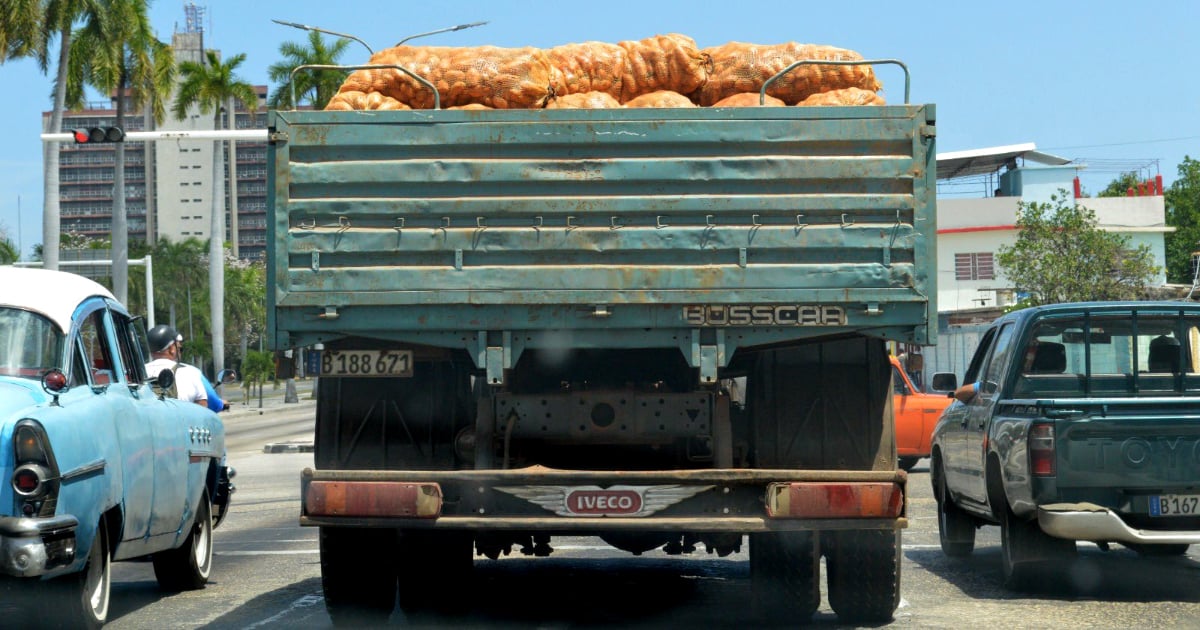
Related videos:
Potatoes, an essential food in the Cuban diet, have become a scarce commodity throughout the year. This tuber, which is in high demand among the population, is only available through the rationing system in small quantities and with variable quality during the harvest season.
State distribution, micro, small, and medium-sized enterprises (Mipymes), self-employed individuals, and the black market are the economic players involved. However, it is the black market where the supply of potatoes is most consistent, albeit at prohibitive prices for the average Cuban worker.
On the black market, a pound of potatoes is priced between 150 and 200 pesos, depending on their quality. There are several ways to acquire them: by order, made through social media with additional home delivery fees, or through street vendors who operate under the constant risk of being discovered by the police or inspectors, which could lead to severe fines.
An analysis published by the non-governmental organization Food Monitor Program questioned the source of the potatoes sold on the black market, considering that the state is the only entity authorized to import, produce, and sell them in the country
The answer lies in a complex web of corruption and resource diversion involving various actors within the state distribution system, the NGO stated in an article published on its website this Tuesday.
The potato in Cuba has two sources: imports and domestic production, both strictly controlled by the state. However, once the tuber enters the national distribution network, a web of corruption spreads across the entire country.
Storekeepers, transporters, operators of state-run agro-markets, and ordinary citizens are all part of this corrupt network. The natural loss of the product is used as an excuse to justify the tons of potatoes that disappear within the distribution chain.
From large wholesale stores to community agricultural markets, resource diversion is common. Potato sacks are often diverted and sold illegally to loaders and drivers during transport.
In the small markets, administrators prefer to receive deliveries on Saturday afternoons to take advantage of corruption, as they don’t open on Sundays, and on Mondays they justify their losses with spoiled potatoes, allowing the illegal sale of the remaining bags.
Retail resellers are the final link in this chain of corruption. These individuals, shaped by years of illegal dealings, have the necessary contacts to ensure a constant supply of potatoes. They operate in local agromarkets and some state-run outlets, selling potatoes from their homes or offering delivery through social media. The most powerful among them have distributors who sell the product in small quantities at exorbitant prices.
The most affected party is the ordinary citizen, who cannot access potatoes at affordable prices. Beyond individual and institutional responsibilities, the root of the problem lies in the collectivist agri-food policies and the lack of incentives for food production in Cuba.
The totalitarian system does not have effective answers to these problems, as a genuine economic opening would undermine its own sociopolitical foundations. Hunger and scarcity in Cuba have become everyday phenomena, making it clear that a structural change is needed to address this food crisis.
The Food Monitor Program clearly indicates that the right to food has been used as a tool of domination in Cuba since the introduction of the rationing booklet in March 1962.
Starting from the assumption that the State-Party's extensive intervention eliminated citizens' agency, transformed their eating practices, controlled their time, and managed their private lives, its experts point out that the promise of the so-called "revolution" to guarantee social and economic rights like food was made at the cost of the loss of civil and political rights.
The Food Monitor Program aims to deconstruct the myth of food sovereignty in Cuba by dismantling justifications for the blockade and highlighting its political exploitation. Additionally, it seeks to prevent these models from being further promoted in the region and from serving as a means to dismantle democracy and the rule of law.
Filed under: